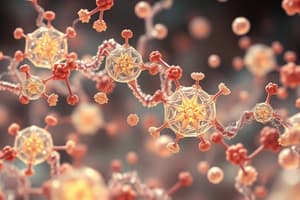Podcast
Questions and Answers
What is the primary function of carbohydrates in the body?
What is the primary function of carbohydrates in the body?
- Regulating body temperature
- Aiding in the synthesis of proteins
- Providing structural support
- Serving as the primary energy source (correct)
What is the formula for a polysaccharide?
What is the formula for a polysaccharide?
- C6H12O6
- C6H10O5
- (CH2O)n
- (C6H10O5)n (correct)
What is the function of cellulose in the body?
What is the function of cellulose in the body?
- Providing dietary fiber and aiding digestion (correct)
- Regulating body temperature
- Aiding in the synthesis of proteins
- Providing energy storage
What are the building blocks or monomers of carbohydrates?
What are the building blocks or monomers of carbohydrates?
What is the type of carbohydrate used for energy storage in animals?
What is the type of carbohydrate used for energy storage in animals?
What is the main function of proteins in the body?
What is the main function of proteins in the body?
What is the general formula of amino acids that make up proteins?
What is the general formula of amino acids that make up proteins?
What is the purpose of the iodine test?
What is the purpose of the iodine test?
What is the result of a positive Benedict's test?
What is the result of a positive Benedict's test?
What is the composition of nucleic acids?
What is the composition of nucleic acids?
Flashcards are hidden until you start studying
Study Notes
- Biomolecules are molecules produced by living organisms and include large macromolecules such as proteins, polysaccharides, lipids, and nucleic acids.
- Biomolecules are obtained from food and are essential for human life, providing energy and keeping organisms alive.
- There are four main types of biomolecules: carbohydrates, proteins, nucleic acids, and lipids.
- Carbohydrates are the most common biomolecules and serve as the primary energy source of the body.
- Carbohydrates are sugars, and the formula for a carbohydrate is (CH2O)n, where n is the number of molecules.
- Monosaccharides are the building blocks or monomers of carbohydrates, with examples including glucose, fructose, and galactose.
- Carbohydrates can be classified into three types: monosaccharides, disaccharides, and polysaccharides.
- Monosaccharides are simple sugars with the formula C6H12O6, and examples include glucose, fructose, and galactose.
- Disaccharides are formed by combining two monosaccharides, with examples including maltose, lactose, and sucrose.
- Polysaccharides are complex sugars with the formula (C6H10O5)n, and examples include starch, glycogen, cellulose, and chitin.
- Starch is used for energy storage in plants and provides a quick form of energy for the body, found in foods such as potatoes, pasta, and rice.
- Glycogen is used for energy storage in animals and is stored in the liver and muscles.
- Cellulose is found in plant cell walls and bark, providing dietary fiber and aiding digestion.
- Chitin forms the exoskeleton of certain insects and crustaceans.
- Two tests are used to detect the presence of carbohydrates: the iodine test for starch and the Benedict's test for simple carbohydrates.- The iodine test is used to detect the presence of starch in food, which signals the presence of carbohydrates.
- In the iodine test, a bluish color indicates the absence of starch, while a yellow, orange, red, or brick-red color indicates the presence of starch.
- The Benedict's test is used to detect the presence of simple carbohydrates, and the color of the Benedict's solution changes from blue to green, yellow, orange, or red depending on the sugar content.
- Proteins are body-building molecules that help grow and repair cells, transport molecules, and control chemical reactions.
- Proteins are composed of amino acids, have a general formula of RCH(NH2)COOH, and contain carbon, hydrogen, oxygen, and nitrogen.
- Examples of proteins include soy albumin, hemoglobin, enzymes, and gelatin.
- The Biuret test is used to detect the presence of proteins, and a color change from blue to purple indicates the presence of a peptide bond.
- Nucleic acids are biomolecules that are important components of heredity and are found in DNA.
- Nucleic acids are composed of nucleotides and contain carbon, hydrogen, oxygen, nitrogen, and phosphorus.
- Adenine, thymine, cytosine, and guanine are the four nucleotides that make up nucleic acids.
- Lipids are energy-giving molecules that are stored for long-term energy and are composed of fatty acids.
- The general formula for lipids is CH3(CH2)nCOOH, and they contain carbon, hydrogen, and oxygen.
- Lipids provide protection for internal organs and serve as waterproof coverings in some plants and animals.
- Examples of lipids include steroids, cholesterol, fats, oils, nuts, and waxes.
- The ethanol emulsion test is used to detect the presence of lipids, and a cloudy or milky appearance indicates the presence of lipids.
Studying That Suits You
Use AI to generate personalized quizzes and flashcards to suit your learning preferences.




